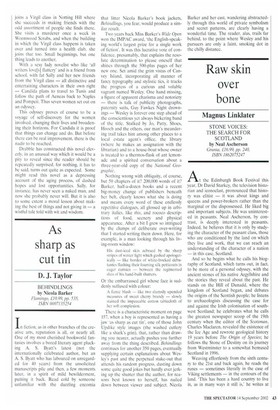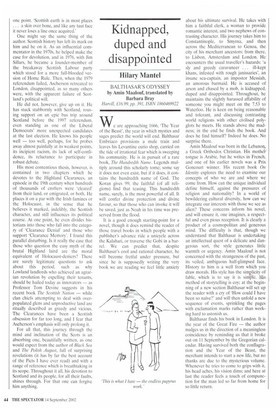Raw skin over bone
Magnus Linklater
STONE VOICES: THE SEARCH FOR SCOTLAND by Neal Ascherson Granta, 116.99, pp. 240, ISBN 1862075247 At the Edinburgh Book Festival this year, Dr David Starkey, the television historian and iconoclast, pronounced that history was elitist — it was about kings and queens and power-brokers rather than the marginal or the dispossessed. He liked big and important subjects. He was uninterested in peasants. Neal Ascherson, by contrast, is deeply interested in peasants. Indeed, he believes that it is only by studying the character of the peasant class, those who are conditioned by the land on which they live and work, that we can reach an understanding of the character of a nation
in this case, Scotland.
And so he begins what he calls his biography of Scotland, which turns out, in fact, to be more of a personal odyssey, with the ancient stones of his native Argyllshire and the stories they reveal about the past. He stands on the Hill of Dunadd, where the kingdom of Scotland began, and debates the origins of the Scottish people; he listens to archaeologists discussing the case for and against the Irish colonisation of southwest Scotland: he celebrates what he calls the greatest newspaper scoop of the 19th century when the editor of the Scotsman, Charles Maclaren, revealed the existence of the Ice Age and rewrote geological history 19 years before The Origin of Species; he follows the Stone of Destiny on its journey from Westminster to a somewhat bemused Scotland in 1996.
Weaving effortlessly from the sixth century to the 21st and back again, he reads the runes — sometimes literally in the case of Viking settlements — in the contours of the land. 'This has been a hard country to live in, as in many ways it still is,' he writes at one point. 'Scottish earth is in most places ... a skin over bone, and like any taut face it never loses a line once acquired.'
One might say the same thing of the author. Scottish history has left its mark on him and he on it. As an influential commentator in the 1970s, he helped make the case for devolution, and in 1976, with Jim Siliars, he became a founder-member of the breakaway Scottish Labour party which stood for a more full-blooded version of Home Rule. Then, when the 1979 referendum failed. Ascherson retreated to London, disappointed, as so many others were, with the apparent failure of Scotland's political will.
He did not, however, give up on it. He has stuck stubbornly with Scotland, rousing support on an epic bus trip around Scotland before the 1997 referendum, even standing as one of the Liberal Democrats' more unexpected candidates at the last election. He knows his people well — too well, perhaps, for he probes away almost painfully at its weakest points, its incipient racism, its lack of self-confidence, its reluctance to participate in robust debate.
His most contentious thesis, however, is contained in two chapters which he devotes to the Highland Clearances, an episode in the 19th century when hundreds of thousands of crofters were 'cleared' from their land, or emigrated, or both. He places it on a par with the Irish famines or the Holocaust, in the sense that he believes it marked, indelibly, the Scottish character, and still influences its political course. At one point, he even divides historians into those who fall into the category of 'Clearance Denial' and those who support 'Clearance Memory'. I found this parallel disturbing. Is it really the case that those who question the easy myth of the brutal Highland laird are the moral equivalent of Holocaust-deniers? There are surely legitimate questions to ask about this period, such as why Lowland landlords who achieved an agrarian revolution by expelling their tenants, should be hailed today as innovators — as Professor Tom Devine suggests in his recent book The Scottish Nation — while clan chiefs attempting to deal with overpopulated glens and unproductive land are ritually described as greedy and vicious. The Clearances have been a Scottish obsession for far too long, and I fear that Ascherson's emphasis will only prolong it.
For all that, this journey through the mind and inclination of the Scots is an absorbing one, beautifully written, as one would expect from the author of Black Sea and The Polish August, full of surprising revelations (it has by far the best account of the Picts I have ever read) and with a range of reference which is breathtaking in its scope. Throughout it all, his devotion to Scotland and its people, for all their faults, shines through. For that one can forgive him anything.











































































 Previous page
Previous page